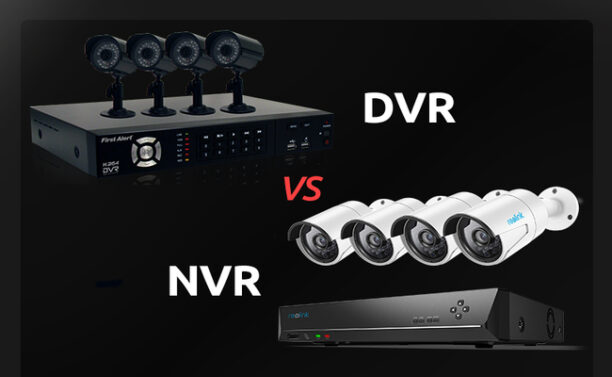Before talking about Difference Between NVR vs DVR .Here I Explain you about NVR and DVR.
You may already know that a DVR is a digital video recorder because cable boxes are common, but DVR security cameras are very different. The difference between a DVR and a network video recorder depends on how they record video. The DVR takes live video from the camera via coaxial cable and then processes it for recording.
NVR systems are similar but they do not process video, the NVR only catalogs and stores the video that the IP camera transmits to the NVR. In more technical terms, the DVR encodes and stores the video signal, while the NVR stores the video that the camera encodes.
Table of Contents
Difference Between NVR vs DVR

DVR
A DVR, or digital video recorder, is a recording device that records video in a digital format and stores it on a hard drive instead of a video tape. It requires video signals to be digitized and compressed so that video streams can be stored for as many days as possible. Security systems using DVRs play an important role in alarm verification and security assessment. Digital video images are stored on hard drives similar to those used in PCs and have storage space measured in gigabytes. It provides an inexpensive but effective method for storing compressed video files. They are mainly used to record analog or coaxial cameras.
The following components are required to set up an DVR system.
Analog cameras:
As stated earlier, DVR systems use analog cameras. The camera is responsible for transmitting an analog single to the recorder, which then processes the video data. Unlike NVR, most DVR cameras are cheaper.
Coaxial Cable:
Coax cable connects the analog camera to the DVR system. The use of coax cables seems insignificant due to their limitations; however, data is ultimately transmitted over this type of cable. Coaxial cable does not support source devices on the same line. Therefore, another cable is needed to transmit the electrical signal, while the other cable carries the data signal to transmit video. These cables are stiffer and wider than Ethernet cables, which makes installation difficult. Additionally, audio is a limitation as standard coax cables may not support audio transmission.
AD Encoder:
DVR recorders rely heavily on AD encoders, which are responsible for processing the raw data transmitted from the camera into viewable footage. As such, each security camera system must be connected to both its own recorder and power source.
Benefits of DVR system
There are a few notable advantages of DVR systems that make them increasingly attractive.
- Minimum bandwidth usage
- Stable signal
- Low price
NVR
NVR, or Network Video Recorder, is an electronic recording device that uses digital or analog cameras converted to IP cameras by a network server. The digital data is then transferred to the network according to the TCP/IP transport protocol and recorded by an NVR. It is a standalone system that houses computer, software, storage, and Power over Ethernet (PoE) multiport switch in a single device. NVRs are plug-and-play devices similar to DVRs, except they are used with IP cameras instead of analog cameras.
The following components are required to set up an NVR system.
IP cameras:
The NVR system uses an IP camera, which acts as a stand-alone imaging device. These cameras can process video data before sending it to the recorder. IP cameras are powerful and capable of recording and transmitting audio in addition to images. The advanced hardware in these cameras enhances intelligent video analytic, such as license plates and facial recognition.
Ethernet cable:
NVR systems use standard Ethernet cables such as Cat5e and Cat6 to connect the camera to the recorder. They are easier to install due to their slim size and shape, cost effectiveness and easy availability compared to coax cables.
Recorder:
NVR recorder is only responsible for storing and viewing images. The system does not process video data.
Benefits of NVR
- System Here are some important advantages of an NVR system: Better picture quality
- More flexible system
- Easy to install
Choosing Right Video Recorder
NVR and DVR are two great options for a reliable security camera system. In the past, if you wanted higher resolution, you would use an NVR, but DVRs have caught up to the resolution and offer a cheaper alternative. The biggest deciding factor will depend on your cable preferences. If you already have existing cabling and it’s a good quality RG59 cable, this will influence your decision for a DVR if you want to keep your existing cameras and some HD IP cameras later.
However, if cable replacement is a task you’re comfortable with, an NVR would be the way to go, as network cables offer the simplicity of PoE. The image below summarizes the cabling differences between DVR and NVR.

Properties of NVR vs DVR
DVR Properties |
NVR Properties |
|
|
|
|
|
|
|
|
|
|
|
|
|
|
|
|
|
If you want know about best Video recorder for your CCTV Cameras or You want install CCTV cameras in your places then you can call us our TVDIT Expert Team.
Tel:04-3713374
WhatsApp +971-56 -733 -2396 / +971-52-217-0403
Here Are our Prestigious Clients Companies where TVDIT Provide Services

0 Comments